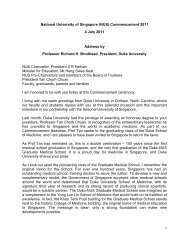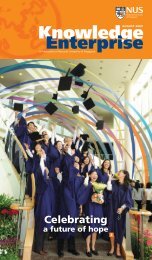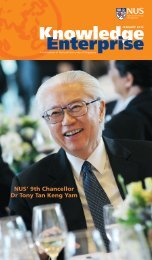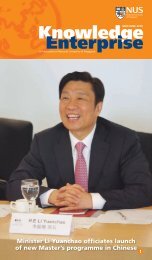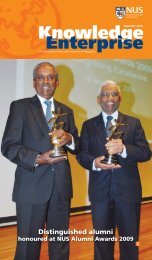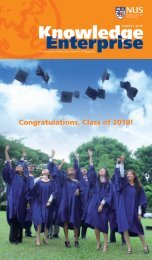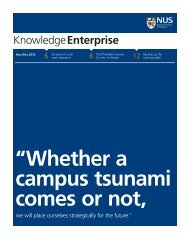NUS Solar Energy Research Institute: - NewsHub - National ...
NUS Solar Energy Research Institute: - NewsHub - National ...
NUS Solar Energy Research Institute: - NewsHub - National ...
You also want an ePaper? Increase the reach of your titles
YUMPU automatically turns print PDFs into web optimized ePapers that Google loves.
FEBRUARY 2010<br />
A Publication of <strong>National</strong> University of Singapore<br />
<strong>NUS</strong> <strong>Solar</strong> <strong>Energy</strong> <strong>Research</strong> <strong>Institute</strong>:<br />
Taking the lead in solar energy research<br />
and development<br />
2
Inaugurating the <strong>NUS</strong> <strong>Solar</strong> <strong>Energy</strong><br />
<strong>Research</strong> <strong>Institute</strong>’s new premises<br />
The inauguration of the new premises of<br />
the <strong>NUS</strong> <strong>Solar</strong> <strong>Energy</strong> <strong>Research</strong> <strong>Institute</strong> of<br />
Singapore (SERIS) was held on 19 November<br />
2009. Gracing the event was Guest-of-Honour<br />
Chairman of the <strong>National</strong> <strong>Research</strong> Foundation<br />
Dr Tony Tan, as well as some 250 local and<br />
international guests from the industry,<br />
government and research sectors.<br />
Said Dr Tan: “SERIS occupies a vanguard<br />
position in Singapore’s push towards building<br />
up strong R&D capabilities to position<br />
Singapore well as a hub for Clean <strong>Energy</strong><br />
business activities.” He added that cities within<br />
the tropics including Manila, Jakarta, Bangkok<br />
and Kuala Lumpur would also benefit from<br />
SERIS’ research.<br />
A research institute sponsored by the Singapore<br />
Economic Development Board and <strong>NUS</strong>, SERIS<br />
was officially launched in early 2008 by Minister<br />
of State for Trade and Industry Mr S Iswaran.<br />
The institute’s focus is on the research and<br />
development of silicon solar cells and molecules<br />
(wafer and thin-film), nano-structured<br />
solar cells, PV (solar photovoltaics) module<br />
performance analysis, solar and energy efficient<br />
buildings as well as PV systems technology.<br />
With a S$130 million budget for the next<br />
five years, SERIS plans to employ more than<br />
100 researchers by 2012. The institute will be<br />
expanding from its current size of more than<br />
3,000m² to a total of approximately 5,000 m² of<br />
space by the end of this year.<br />
“With our industry-oriented expertise, global<br />
network with leading R&D institutions and highclass<br />
technical infrastructure, SERIS is set to make<br />
Singapore an important regional hub for further<br />
research and development of solar energy in<br />
Asia,” said Chief Executive Officer of SERIS Prof<br />
Joachim Luther.<br />
Aside from SERIS, <strong>NUS</strong> President Prof Tan Chorh<br />
Chuan noted that the University had much<br />
research expertise in the field of environmental<br />
sustainability. He cited the <strong>NUS</strong> Environmental<br />
<strong>Research</strong> <strong>Institute</strong>, the Centre for Sustainable<br />
Asian Cities as well as the Centre for Water<br />
<strong>Research</strong> and the <strong>Energy</strong> Studies <strong>Institute</strong> as<br />
examples of <strong>NUS</strong>’ research expertise in this area.<br />
KNOWLEDGE ENTERPRISE<br />
2<br />
COLLABORATION: (From left) Chairman of the <strong>National</strong> <strong>Research</strong> Foundation Dr Tony Tan with<br />
Chief Executive Officer of SERIS Prof Joachim Luther and <strong>NUS</strong> President Prof Tan Chorh Chuan.
<strong>NUS</strong> appoints new senior administrators<br />
<strong>NUS</strong> announced four new appointments to the<br />
Office of the Provost, Office of the Vice President<br />
(University and Global Relations), Faculty of<br />
Arts and Social Sciences (FASS) and Faculty of<br />
Dentistry on 7 December 2009.<br />
Prof Tan Tai Yong, Director of the <strong>Institute</strong> of<br />
South Asian Studies (ISAS) and former Dean of<br />
FASS, has taken up the position of Vice-Provost<br />
(Student Life) with effect from 1 January 2010.<br />
Assoc Prof Peter Pang, currently an Associate<br />
Professor with the <strong>NUS</strong> Department of<br />
Mathematics, has been appointed Assistant Vice<br />
President (University and Global Relations). Prof<br />
Brenda Yeoh, former FASS Vice-Dean (<strong>Research</strong>),<br />
is now heading FASS as its new Dean. Assoc Prof<br />
Grace Ong, former Head of Preventive Dentistry,<br />
helms the Faculty of Dentistry as the first<br />
female Dean in the Faculty of Dentistry’s 80<br />
years of history.<br />
She added: “We want to harness our diversity<br />
in equipping students with flexible minds and a<br />
clear sense of values in a fast-changing world,<br />
and also in building pinnacles of research<br />
excellence in areas which are meaningful and<br />
enduring.”<br />
Regarding her vision for the Faculty of<br />
Dentistry, Assoc Prof Ong who is a specialist<br />
in periodontics, said: “I look forward to<br />
consolidating and building up research<br />
capabilities of the Faculty of Dentistry. We<br />
will continue to place a strong emphasis on<br />
nurturing oral health physicians who are ethical<br />
and socially responsible. As part of the <strong>National</strong><br />
University Health System, the <strong>NUS</strong> Faculty of<br />
Dentistry will enhance our clinical services<br />
to serve the oral<br />
health needs of<br />
Singapore.”<br />
In his capacity as Vice-Provost (Student Life),<br />
a newly-created position, Prof Tan is assisting<br />
<strong>NUS</strong> Deputy President (Academic Affairs) and<br />
Provost Prof Tan Eng Chye to oversee student<br />
matters, University Town and the Residential<br />
Colleges, the Centre for English Language<br />
Communication as well the Office of Student<br />
Affairs and the Halls of Residence. “I am<br />
working towards creating an intellectually,<br />
socially and culturally vibrant environment<br />
for our students to encourage them to<br />
learn and grow beyond the<br />
classroom. Students should find<br />
full opportunities to enlarge and<br />
enrich their learning experiences<br />
at <strong>NUS</strong>,” said Prof Tan, who<br />
continues to hold his concurrent<br />
appointment as Director of ISAS.<br />
Speaking on his new appointment<br />
as Assistant Vice President<br />
(University and Global Relations),<br />
Assoc Prof Pang said: “<strong>NUS</strong> is<br />
one of the world’s leading global<br />
universities. It plays a leadership<br />
role in important international<br />
university alliances and is a much sought after<br />
university partner. As the world undergoes a<br />
‘structural shift’, I believe <strong>NUS</strong> is in an excellent<br />
position to build on its strengths and further<br />
enhance its standing as a global university. I am<br />
thrilled to join the Office of the Vice President<br />
(University and Global Relations) at this critical<br />
juncture and will do my best to contribute to<br />
<strong>NUS</strong>’ global profile.”<br />
On the direction of FASS, Prof Yeoh said the<br />
faculty would continue to build its strengths as a<br />
premier institution for education and research in<br />
the humanities, social sciences and Asian studies.<br />
<strong>NUS</strong> NEW ADMINISTRATORS:<br />
(From the top) Prof Tan Tai<br />
Yong, Assoc Prof Peter Pang,<br />
Prof Brenda Yeo and Assoc<br />
Prof Grace Ong.<br />
FEBRUARY 2010<br />
3
HIGHLIGHTS<br />
Permanent Secretary (Education)<br />
of Hong Kong visits<br />
Mr Raymond Wong Hung-chiu, Permanent<br />
Secretary (Education) of Hong Kong Special<br />
Administrative Region of the People’s Republic<br />
of China, called on <strong>NUS</strong> on<br />
14 January 2010. During his<br />
visit, Mr Wong met with the<br />
University’s senior administrators<br />
- <strong>NUS</strong> Deputy President (<strong>Research</strong><br />
& Technology) Prof Barry<br />
Halliwell, <strong>NUS</strong> Deputy President<br />
(Administration) Mr Joseph<br />
Mullinix and <strong>NUS</strong> Vice Provost<br />
(Education) Prof Tan Thiam Soon.<br />
Topics discussed during<br />
the meeting included the<br />
development of Singapore as<br />
an education hub as well as the<br />
policies and practices on the<br />
development of higher education.<br />
Accompanying Mr Wong on his<br />
visit to <strong>NUS</strong> were Hong Kong’s<br />
Deputy Secretary (Education) Ms<br />
Michelle Li and Assistant Secretary<br />
(Higher Education) Mr Eric Cheng.<br />
Representatives from the Hong<br />
Kong Economic and Trade Office,<br />
Singapore, were also present at<br />
the visit.<br />
To date, <strong>NUS</strong>’ partnership with universities in<br />
Hong Kong include The Chinese University of<br />
Hong Kong, City University of Hong Kong and<br />
University of Hong Kong.<br />
NURTURING TIES: Hong Kong Permanent Secretary (Education)<br />
Mr Raymond Wong (left) with <strong>NUS</strong> Deputy President (<strong>Research</strong><br />
and Technology) Prof Barry Halliwell (right).<br />
<strong>NUS</strong> and Temasek Foundation establish the English<br />
Language Training Project in Southeast Asia<br />
KNOWLEDGE ENTERPRISE<br />
GLOBAL<br />
<strong>NUS</strong> and Temasek Foundation<br />
Singapore jointly announced<br />
the inception of the English<br />
Language Training (ELT)<br />
programme on 4 December 2009.<br />
This is a three-year inaugural<br />
project aimed at developing<br />
a regional framework of core<br />
competencies within ASEAN for<br />
the teaching of English language<br />
for professional and business<br />
communication.<br />
The programme was made<br />
possible by a grant of about<br />
S$450,000 from the Temasek<br />
Foundation. It will be led by the<br />
<strong>NUS</strong> Centre for English Language<br />
Communication (CELC) Senior<br />
Lecturers Ms Lee Kooi Cheng<br />
and Dr T. Ruanni F. Tupas, the<br />
Project Directors of the ELT<br />
programme.<br />
Some 65 regional English<br />
Language policy makers and<br />
university faculty will enhance<br />
their capabilities to develop<br />
teaching materials that address<br />
current gaps in contextualising<br />
the learning of English as a<br />
second or third language for<br />
business communication.<br />
Besides <strong>NUS</strong>, six other ASEAN<br />
universities will be participating<br />
in the programme. They are<br />
the Politeknik Negeri Jember,<br />
Jawa Timur and Satya Wacana<br />
Christian University, Salatiga,<br />
from Indonesia; the University<br />
of the Philippines’ Los Baños<br />
campus and Visayas campus<br />
from the Philippines; and Cantho<br />
University and the Vietnam<br />
<strong>National</strong> University from<br />
Vietnam.<br />
The inaugural series held from<br />
4 to 9 December 2009 was<br />
attended by leading faculty<br />
members and policy makers from<br />
the universities. <strong>NUS</strong> CELC and<br />
the participating universities<br />
will develop a framework<br />
of competencies for ASEAN<br />
learners of English and write<br />
materials which are localised<br />
and culturally appropriate in<br />
specific contexts of learning. The<br />
initial framework would lead<br />
to three levels of competencies,<br />
namely basic, intermediate and<br />
advanced.<br />
Up to 70 curriculum developers<br />
from the participating countries<br />
are expected to attend and join<br />
a series of workshops, visits and<br />
research in the course of the<br />
three-year project.<br />
4
Building environmentally<br />
sustainable towns in Singapore<br />
Residents at Punggol Town can look forward<br />
to having a cooler outdoor environment and<br />
naturally ventilated indoor spaces in the near<br />
future. The team led by Assoc Prof Wong Nyuk<br />
Hien, Department of Building at the <strong>NUS</strong> School<br />
of Design and Environment (SDE) has inked<br />
an agreement with the Housing Development<br />
Board (HDB) to optimise the design and<br />
development of a prototype for a green and<br />
sustainable township. This is the first climatic<br />
study conducted in a residential township in<br />
Singapore.<br />
The aims of the year-long study are three-fold:<br />
• <strong>Research</strong>ers will identify hot and cool<br />
spots in the study area with different<br />
parametric variations using the Geographical<br />
Information System software and the<br />
Screening Tool for Estate Environment<br />
Evaluation tool, a software tool developed<br />
jointly by Dr Steve Jusuf Kardinal and Assoc<br />
Prof Wong.<br />
• The wind condition and ventilation potentials<br />
of the study area would also be looked into.<br />
This study would involve a wind tunnel<br />
testing and computational fluid dynamics<br />
(CFD) simulation study.<br />
• Using a solar radiation and daylight analysis<br />
software, the research team will capture<br />
the solar radiation profile of Punggol Town.<br />
The software simulates and calculates the<br />
amount of solar radiation received by the<br />
environment and the buildings. It also<br />
analyses the shadowing effect from the<br />
surrounding buildings.<br />
On how the idea of conducting the climatic<br />
study at Punggol was mooted, Assoc Prof<br />
Wong said: “With rapid urbanisation, there has<br />
been a tremendous growth in population and<br />
buildings in cities. The high concentration of<br />
hard surfaces triggered many environmental<br />
issues. For example, the Urban Heat Island (UHI)<br />
effect is a phenomenon where air temperatures<br />
in densely built cities are higher than the<br />
suburban rural areas. The primary root of UHI is<br />
the rapid urbanisation, which replaces natural<br />
landscape with enormous hard surfaces such<br />
as building facades, roads and pavements in<br />
cities,” he noted.<br />
Assoc Prof Wong said that a long term analysis<br />
of the weather data in Singapore has shown<br />
that the ambient air temperature has increased<br />
by about 1 degree Celsius over the past 20<br />
years. “A study of the UHI effect in Singapore<br />
has also revealed that Singapore has a UHI<br />
intensity (the temperature difference between<br />
rural and urban area) of about 5 degrees<br />
Celsius. To combat such an effect, it is essential<br />
that designers should be conscious of the interrelationship<br />
between urban design and the<br />
climatic conditions,” he said.<br />
The ambitious research project is not without<br />
challenges. Assoc Prof noted that conducting<br />
the township-scale of CFD study required<br />
extensive computing resources and<br />
knowledge. “We have to work closely<br />
to meet with the development schedule<br />
of the Punggol waterway, so that<br />
the findings of this study are able to<br />
provide feedback to the design of<br />
Punggol,” he noted.<br />
SUSTAINABILITY STUDY: Assoc Prof Wong Nyuk Hien.<br />
The researchers from the HDB Building<br />
<strong>Research</strong> <strong>Institute</strong> and <strong>NUS</strong> have a<br />
funding of close to S$960,000 from<br />
the Ministry of <strong>National</strong> Development, HDB<br />
and <strong>NUS</strong>. The research project is coordinated<br />
by SDE’s Centre for Sustainable Asian Cities.<br />
Preliminary results in developing this prototype<br />
for a green and sustainable township are<br />
expected in the middle of next year.<br />
FEBRUARY 2010<br />
5
ACCOLADES<br />
Embarking on the path of a Fulbright Scholar<br />
Ms Gwynne Lim Shimin, an <strong>NUS</strong> Master of Science<br />
(Life Sciences) student, has won the prestigious<br />
International Fulbright Science and Technology<br />
Award 2009. On becoming a Fulbright scholar,<br />
Gwynne said: “The scholarship award came as<br />
quite a surprise. My parents knew that I was keen<br />
in furthering my studies, but their main concern<br />
was funding.” She added that it was a relief for her<br />
parents when they knew about the award of the<br />
scholarship.<br />
Gwynne was in the University Scholars Programme<br />
when she was an undergraduate in <strong>NUS</strong> and it was<br />
during that time when Gwynne was more involved<br />
in research. Since then, she has gone on to excel<br />
in her research interests in systematic botany and<br />
entomology, biogeography and co-evolution<br />
as well as Southeast Asian Biodiversity. To date,<br />
she has published four papers, including one in<br />
Annual Review of Entomology and participated in<br />
international conferences including the Willi Hennig<br />
Society meetings and the 6th International Congress<br />
of Dipterology in Fukuoka, Japan. She was also<br />
the Editor-in-Chief of the inaugural issue of <strong>NUS</strong>’<br />
chapter of “The Triple Helix” which is dedicated to<br />
popularising science across the campuses of major<br />
world universities.<br />
When asked how her education at <strong>NUS</strong> will equip her<br />
for her PhD studies, Gwynne said: “<strong>NUS</strong> is magnificent<br />
in that it gave me opportunities to do my own<br />
research. Beyond anything else, the ability to take<br />
control and shape my education was instrumental in<br />
building the kind of confidence I have in conducting<br />
my own research and writing for publications.”<br />
While she is in the process of applying to American<br />
universities, Gwynne already plans to pursue her<br />
Ph.D. in systematic botany. “I intend to reconstruct<br />
the historical events that have led to the co-evolution<br />
of plants and insects in Southeast Asia and look at the<br />
unique geography of this region by determining the<br />
relationships of a mega-diverse group,” she said.<br />
FULBRIGHT SCHOLAR: Ms Gwynne Lim Shimin.<br />
More on the Fulbright Scholar Program<br />
The Fulbright Scholar Program was<br />
established in 1946 under legislation<br />
introduced by former Senator J. William<br />
Fulbright of Arkansas. The scholarship<br />
award provides talented foreign students<br />
with the opportunity to pursue PhD<br />
studies in top American universities and<br />
develop leaders who can contribute<br />
in promoting better understanding<br />
between the United States and<br />
Singapore. Sponsored by the Bureau of<br />
Educational and Cultural Affairs of the<br />
US Department of State, the scholarship<br />
comes with assistance in admission as well<br />
as three years of full financial support.<br />
<strong>NUS</strong> wins at SHOOOT Awards 2009<br />
KNOWLEDGE ENTERPRISE<br />
6<br />
Three <strong>NUS</strong> entries won at this<br />
year’s SHOOOT Awards, clinching<br />
the Best TVC award (school), Best<br />
Long Machinima (school) award<br />
and Best Visual Effects award<br />
(school). The SHOOOT Awards aims<br />
to rejuvenate creativity, inspire<br />
innovation and proliferate the<br />
best of practices in New Media<br />
content creation. It is an initiative<br />
supported by the Ministry of<br />
Information, Communications and<br />
the Arts as well as the Creative<br />
Community Singapore.<br />
The winning entries from <strong>NUS</strong> are:<br />
Best TVC Machinima award<br />
(school) for “Smoking is ‘Good’”<br />
– a humorous short film about the<br />
dangers of smoking<br />
Best Long Machinima (school)<br />
for “The Homecoming” – a short<br />
story about a Peranakan woman<br />
returning from abroad to her roots<br />
Best Visual Effects award (school)<br />
for “Love of Lothlorien”<br />
“Smoking is ‘Good’” and “The<br />
Homecoming” are the short and<br />
final assignments of six students<br />
reading the course “Serious Games<br />
& Learning Media” from the<br />
Communications and New Media<br />
(CNM) programme, Faculty of Arts<br />
and Social Sciences. The course<br />
was developed and taught by Dr<br />
Timothy Marsh. The students are<br />
John Yap Yin Gwee (CNM), Cao<br />
Yuanying (CNM), Rosalie Hooi<br />
Chet Yeu (CNM), Tan Jian Wei<br />
(Computing) and Eugene Seah Zhu<br />
En (Computing) and Charles Pang<br />
T-Howe (Engineering).<br />
The “Love of Lothlorien” entry was<br />
submitted by the <strong>NUS</strong> Second Life<br />
student community.<br />
To view the winning entries from<br />
<strong>NUS</strong>, please visit www.youtube.<br />
com/nuscast.
MARK OF EXCELLENCE<br />
We proudly celebrate the following recent achievements:<br />
• The <strong>NUS</strong> Logistics <strong>Institute</strong> – Asia Pacific (TLI -<br />
Asia Pacific) clinched the Education & Training<br />
Award at the Supply Chain Asia Logistics Awards<br />
2009. The Award is a recognition of TLI - Asia<br />
Pacific as a leader in the field of education<br />
and training in the supply chain and logistics<br />
industry in Asia. Established 10 years ago, TLI -<br />
Asia Pacific is a collaboration between <strong>NUS</strong> and<br />
the Georgia <strong>Institute</strong> of Technology for research<br />
and education programmes in global logistics.<br />
From 2003 to 2009, the <strong>Institute</strong> was voted the<br />
Best Educational Course Provider at the Asian<br />
Freights and Supply Chain Awards.<br />
grand winner for their concept of the dragon<br />
brand bird’s nest ice cream while Yu Peigen<br />
and team won the Most Innovative Award for<br />
Flossy Bites – a cracker containing crispy pork<br />
floss and crunchy sunflower seeds as filling.<br />
Their products, together with those from 24<br />
other competing teams, were showcased at<br />
the 6 th Asia Pacific Food Expo. Last year, <strong>NUS</strong><br />
also garnered the Grand Winner and the most<br />
innovative award in the same competition.<br />
ACCOLADES<br />
GRAND WINNER: Dragon Brand Bird’s Nest Ice Cream.<br />
EDUCATION & TRAINING AWARD WIN: (From left) Supply<br />
Chain Asia Founder & President Mr Paul Lim, TLI-Asia Pacific<br />
Executive Director Dr Robert de Souza and Supply Chain<br />
and Logistics <strong>Institute</strong> Director Mr Harvey Donaldson.<br />
• Two <strong>NUS</strong> teams clinched the Grand Winner<br />
and the Most Innovative Award respectively at<br />
last year’s Food Product Concept Competition<br />
organised by the Singapore Food Manufacturers’<br />
Association and supported by SPRING Singapore<br />
and International Enterprise Singapore. The<br />
team led by Teo Jia Han Herman was the<br />
• <strong>NUS</strong> Business School (BIZ) has attained the<br />
renowned European Quality Improvement<br />
System (EQUIS) accreditation that is aimed<br />
at raising the standard of management<br />
education worldwide. This takes BIZ to the<br />
ranks of premier business schools such as the<br />
London Business School and Judge Business<br />
School at the University of Cambridge.<br />
Managed by the European Foundation for<br />
Management Development, EQUIS is supported<br />
by an international body of academics and<br />
professionals. It is a leading international<br />
system of quality assessment, improvement and<br />
accreditation of higher education institutions in<br />
management and business administration.<br />
AT A GLANCE<br />
• In memory of law alumna Ms Lo Hwei Yen who<br />
passed away in the 2008 Mumbai terrorist attack,<br />
the <strong>NUS</strong> Faculty of Law announced the launch<br />
of the Lo Hwei Yen Memorial Scholarship on<br />
27 November 2009. The scholarship will be an<br />
endowment to be maintained in perpetuity. The<br />
initial endowment was pledged by Lo Hwei Yen’s<br />
law firm Stephenson Harwood, Singapore, and<br />
applications are expected to open in the second<br />
quarter of 2010 for promising fourth year law<br />
students. The first scholarship recipient will be<br />
selected for the academic year beginning August<br />
2010. The recipient will receive an award with a<br />
minimum amount of S$6,000 to be used towards<br />
tuition fees.<br />
• In a study led by a team of economists and<br />
molecular geneticists from <strong>NUS</strong>, the Hong Kong<br />
University of Science and Technology (HKUST)<br />
and the Hebrew University, it was found that the<br />
explanation behind the risk-taking behaviours of<br />
people could be due to our genetic makeup. Prof<br />
Chew Choo Hong of the Department of Economics<br />
of <strong>NUS</strong> and HKUST who has researched on this<br />
subject with Dr Richard Ebstein, Sylvia Scheinfeld<br />
Professor of Human Genetics at the Hebrew University<br />
and Dr Zhong Songfa from HKUST, noted that<br />
while there has been a psychological explanation<br />
for the facet of economic behaviour, the underlying<br />
neurobiological and neurogenetic mechanisms have<br />
remained obscure until now. The tools of experimental<br />
economics and molecular genetics were<br />
used to examine the role of a well-characterised<br />
gene, monoamine oxidase A (MAOA), in predicting<br />
whether subjects are more disposed to purchase<br />
lottery as well as insurance under well-controlled<br />
laboratory conditions using 350 Han Chinese subjects<br />
recruited in Beijing. It was found that subjects<br />
with a high-activity MAOA variation of the gene<br />
are characterised by a preference for the longshot<br />
lottery and less insurance purchase than subjects<br />
with the low-activity genetic version. This is the first<br />
result to link attitude towards longshot risks to a<br />
specific gene.<br />
FEBRUARY 2010<br />
7
Maurice Baker Scholarship and Prize to nurture literary talents<br />
The <strong>NUS</strong> Faculty of Arts and Social Sciences (FASS)<br />
launched the Maurice Baker Scholarship and the<br />
Maurice Baker Prize on 8 December 2009. Aimed<br />
at grooming literary scholars and funded by Dr<br />
Maurice Baker, an eminent <strong>NUS</strong> alumnus and one of<br />
Singapore’s first-generation diplomats, the Scholarship<br />
and Prize have raised close to S$140,000. This amount<br />
will be matched dollar-for-dollar by the Singapore<br />
Government.<br />
Valued at S$10,000 per year, the Maurice Baker<br />
Scholarship will offer financial support to any eligible<br />
full-time Singaporean or Singapore permanent<br />
resident graduate student enrolled in the PhD or the<br />
Masters of Arts by research programme in the <strong>NUS</strong><br />
Department of English Language and Literature. The<br />
first scholarship will be awarded in the academic year<br />
starting August 2010. The Maurice Baker Prize will be<br />
granted to the best graduate in the Department of<br />
English Language and Literature who has achieved<br />
sufficient academic merit. The inaugural prize is<br />
expected to be awarded at the end of the current<br />
academic year.<br />
When asked about his advice to students interested<br />
in a career in literary studies, Dr Baker said: “Well,<br />
the concentration nowadays is for science and<br />
engineering. In the United States, students who<br />
do science or engineering are compelled to do a<br />
year in humanities. So we think that there should<br />
be encouragement for those who want to continue<br />
in literature and language.” He added that the<br />
Scholarship and Prize were set up so as to encourage<br />
the study of the humanities.<br />
SCHOLARSHIP LAUNCH: Dr Maurice Baker and<br />
Mrs Baker (seated, centre) together with former<br />
students, faculty members of the <strong>NUS</strong> Department<br />
of English Language and Literature, friends and<br />
representatives from <strong>NUS</strong> Development Office.<br />
About Dr Maurice Baker<br />
Dr Baker graduated from Raffles College in 1941.<br />
He became the first Singaporean to head the<br />
English Department at the University of Singapore<br />
in 1972 and was <strong>NUS</strong> Pro-Chancellor from 1989 to<br />
2002. In 1981, he was conferred an Honorary Doctor<br />
of Laws by <strong>NUS</strong>. As a diplomat, Dr Baker served as<br />
Singapore’s High Commissioner to Nepal, India and<br />
Malaysia and Ambassador to the Philippines.<br />
Boost for Duke-<strong>NUS</strong> Graduate Medical School to train new<br />
breed of scientist-doctors<br />
A new gift from Ngee Ann Kongsi will provide scholarships to two students every year<br />
By bridging the science lab and hospital ward, students at<br />
the Duke-<strong>NUS</strong> Graduate Medical School (Duke-<strong>NUS</strong> GMS)<br />
experience a new cross-disciplinary learning programme<br />
that will train them to deliver medical breakthroughs<br />
and improve patient medical care. A generous gift of<br />
S$3 million from Ngee Ann Kongsi in December 2009 will<br />
provide up to two scholarships annually to Singaporeans<br />
or permanent residents to study at the School. The<br />
gift is aimed at helping Singapore to become a leading<br />
biomedical centre.<br />
The scholarships, valued at S$50,000 per annum each, will<br />
help medical students with the cost of tuition fees and<br />
living expenses over their four-year training. The first<br />
Scholarship will be awarded from the next academic<br />
year in 2010. Ngee Ann Kongsi’s President Dr Lim<br />
Kee Ming said: “Whether the future doctors serve the<br />
public in the wards, clinics, or by making breakthrough<br />
discoveries in the scientific laboratories, Ngee Ann<br />
Kongsi is committed, as much as the school is, to<br />
grooming these future medical leaders.”<br />
Duke-<strong>NUS</strong> GMS’ Associate Dean of Student Affairs<br />
and Admissions Dr Craig Stenberg said: “The goal is to<br />
develop future leaders in medicine and medical research<br />
who will change and improve the practice of medicine<br />
and who will bridge the gap between the laboratory<br />
and the bedside. Our TeamLEAD curriculum helps<br />
prepare our students to be both advocates for their<br />
patients and society and also clinician scientists with<br />
strong critical and creative thinking skills as well as the<br />
ability to communicate effectively.”<br />
KNOWLEDGE ENTERPRISE<br />
8<br />
CHEQUE PRESENTATION: (From left) Singapore Minister<br />
for Health Mr Khaw Boon Wan, Duke-<strong>NUS</strong> GMS Chairman<br />
Mr Tony Chew, Duke-<strong>NUS</strong> GMS Dean Prof Ranga Krishnan<br />
and Ngee Ann Kongsi President Dr Lim Kee Ming.<br />
KNOWLEDGE ENTERPRISE n FEBRUARY 2010 VOLUME 09 NO. 07<br />
Editor: Jinny Claire Sim n Writer: Veronique Y W Ah Sen n Distribution Manager: Matthew Seah<br />
Office of Corporate Relations, <strong>National</strong> University of Singapore<br />
University Hall, Lee Kong Chian Wing UHL#05-03, 21 Lower Kent Ridge Road, Singapore 119077<br />
Tel: (65) 6516 6822 Fax: (65) 6775 6386 E-mail: Knowledge_Enterprise@nus.edu.sg Website: newshub.nus.edu.sg<br />
ISSN 0219-614X Company Registration Number: 200604346E<br />
Duke-<strong>NUS</strong> GMS student, Ms Sara Tan, who hopes<br />
to specialise in Paediatric Oncology, said that the<br />
innovative education gives students the opportunity to<br />
conduct research by combining clinical care and clinical<br />
science that will ultimately benefit patients.<br />
Help support the transformative education that Duke-<br />
<strong>NUS</strong> students receive by making a gift to the Duke-<br />
<strong>NUS</strong> Colleges and Student Society Help Fund at: www.<br />
giving.nus.edu.sg/duke-nus. Your gift will allow them to<br />
participate in student programmes such as community<br />
service projects, which contribute to their holistic<br />
education at Duke-<strong>NUS</strong> GMS.



